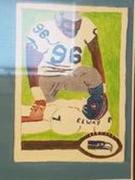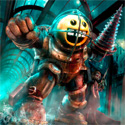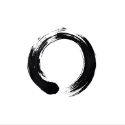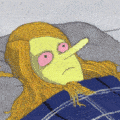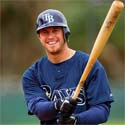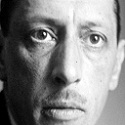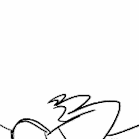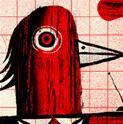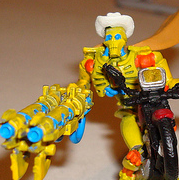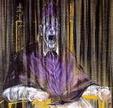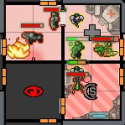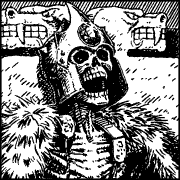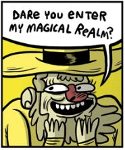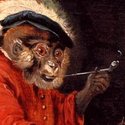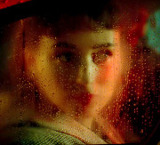|
After not touching a book (other than the Hunger Games trilogy) for nearly ten years, I've decided to jump in. My goal for 2014 is 15 books--I wanted to go a little easy on myself after so long, but I started at the beginning of March and just finished my fifth book so I'll probably be ok. Here's the list: 1. The Immortal Life of Henrietta Lacks - Rebecca Skloot As a microbiology nerd who's worked with HeLa cells, I've been interested in this book for a while. Really glad I read it; though it wasn't exactly my favourite, it presented a fascinating look at medical research history. I also enjoyed the story of the Lacks family itself--Skloot included her adventure of getting Henrietta's story out of her family, which was almost as interesting as the history part. I'd recommend this if you're into biology/medicine. 2. Tell the Wolves I'm Home - Carol Rifka Brunt Nothing that really affected me past the last page, but a decent read. 3. Life of Pi - Yann Martel Another decent read. I don't understand the hype, but it was entertaining enough. 4. Nick and Norah's Infinite Playlist - Rachel Cohn and David Levithan I hated every loving moment of this loving book, in no small part because every other loving word was "loving." 5. The Bone Season - Samantha Shannon Just finished this one about fifteen minutes ago. In my opinion the best of the books I've read thus far. I enjoyed the society that Shannon built, and it was especially notable for its Strong Female Character and a somewhat-bitter love story that lasted for maybe three pages but was still useful for the plot. Apparently it's going to be a series (trilogy?), too. The end of the book made me unsure if I wanted it to stand alone or wanted more, but I am glad there will be. No idea what to read next, so I'll look through a couple threads here and let goons be my guide.
|
|
|
|

|
| # ? May 15, 2024 17:17 |
|
quote:01. The Stranger - Albert Camus 13. Under The Skin - Michael Faber The fun of this book is figuring out what's going on, so it's best not knowing a lot going in. Having said that, I had a vague idea of the story, but it ended up being much different than what I was expecting. I'm looking forward to the movie. 14. Cloud Atlas - David Mitchell Fantasic writing. I loved the way the stories interweave. The only thing I could ding it for was that it felt "long" at times. 15. Flowers for Algernon - Daniel Keyes Heartbreaking story about a mentally challenged man who undergoes an operation to raise his IQ. I was surprised this book was written in the 60s. DannyTanner fucked around with this message at 17:27 on Jul 25, 2014 |
|
|
|
thespaceinvader posted:21: Shades of Milk and Honey was really pretty great actually. I wouldn't normally expect to enjoy a Jane Austen-era romance novel, but it was engaging, interesting, and made me care about the minutia of the characters - the magic helped, but wasn't obtrusive (other than giving lots of excuses for swooning and fainting) - realistically, it was a romance novel with magic, rather than an alternate history fantasy with romance. I'm looking forward to continuing with the series. 22: Glamour in Glass was good. I'm enjoying these. THere's not a lot more to say about them, though, they're fairly light romance with magic (and spies, quite character driven. 23: Without a Summer is in progress. I think I should more than hit my target, I'll probably bump it up some in fact.
|
|
|
|
My goal was 25 books this year and so far my pace is pretty good: 1. The Amber Spyglass I already didn't like book 1 all that much, but I thought this was worse. Much like too many YA trilogies, book 3 is a disaster of wrapping up loose ends in weird ways. Wish I started off the year with something better. 2. The Book Thief I enjoyed it and was actually a fan of the narrator. At times I felt the plot was like Mad Men: lots of build up and suspense for nothing major to happen. 3. Embassytown I'm a China Mieville nerd and this was a very China Mieville book. Aliens? Dense Vocabulary? Great Worldbuilding? A plot completely revolving around language and Language (read it to see what I mean)? Check x4. Usually China sucks at endings, but I thought this one was really good. Protagonist was still weak. 4. Steelheart Another author who I'm guaranteed to enjoy everything he writes. Sanderson really knows how to write fight scenes, and this book was full of fun ones. Plot was a little wonky, but overall a fun read. 5. Goldfinch Agree with most people that this was a fantastic novel only marred by the hotel scene in Amsterdam and the overblown ending monologue. Loved the characters and the language. This book made me never want to do hardcore drugs. 6. Sum: Forty Tales from the Afterlives Super short read. 40 short stories about different possibilities for the afterlife. It's fast and interesting. Lots of great ideas and quotable quotes. I don't suggest a straight read-through since it takes no time and the stories get jumbled. I think it's better as a bathroom book to read a story or two while sending your meals to the afterlife.
|
|
|
|
Blind Sally posted:Brilliant collection, and one of my favourite works by Alexie. If you've never seen it, some of the stories (particularly Victor and Thomas going to get Victor's dead dad's belongings) were adapted into a film, "Smoke Signals", which is worth checking out: https://www.youtube.com/watch?v=5bctCV38FfU Thank you for the link! I saw the movie a while ago and I've been thinking about re-watching it. I've read pretty much everything he's written, partially because I love Alexie and partially for work related reasons, and even when I'm disappointed with one of Alexie's books I still find a story or passage I really like. 9. London's Sinful Secret by Dan Cruikshank. A look at how prostitution influenced the culture, architecture, and history of London during the Georgian era. It's a big book with a lot of information but it's fascinating look at the oldest profession and the people who profited from it. It has more depth than, say, Sex With Kings but it's not super academic and the individual stories Cruikshank chooses to focus on are interesting. Was this teenager really abducted by Gypsies and nearly forced into hooking or did she make it up? We report, you decide.
|
|
|
|
Two books about the plague, because I saw the second one recommended after finishing the first. Both of them had pretty unsatisfying endings. 15) Company of Liars - Karen Maitland. Inspired by the Canterbury Tales. A motley group of lying assholes treks cross-country to escape the Black Death, but considering one of their party is quite blatantly a psychotic witch, they'd probably have been better off with the plague Goodreads review. 16) Year of Wonders - Geraldine Brooks. Loosely based on real events; the self-imposed quarantine of Eyam, a Derbyshire village, in 1665 after a resident accidentally shipped themselves some plague from London. Beautifully written, but unfortunately turns into a soap opera in the last fifty pages. Goodreads review here. Nine nonfiction. Seven fiction. 25% Morrigan saturation rate.
|
|
|
|
1.Roadside Picnic by Strugatsky Brothers 2.The Game of Rat and Dragon by Cordwainer Smith 3.Going Clear: Scientology, Hollywood and the Prison of Belief by Lawrence Wright 4.The Deep Range by Arthur C. Clark 5.The Martian Chronicles by Ray Bradbury Again, I only got one in this month. I'm still on track for my goal of 12 this year, but hopefully I can kick up the rate and get at least 2 done next month. As for the Martian Chronicles, I enjoyed it and I liked the format of the book basically being a string of short stories taking place on Mars. I also had read a quote from Ray Bradbury saying that this wasn't a sci-fi novel, it was a fantasy novel, and it definitely should be read in that context. There really isn't much in terms of science fiction and the elements in there really are much closer to fantasy. I will say that I didn't care for the weird story in the middle of the book about the guy who builds the Poe house and kills the government censors. I appreciate it for basically being a precursor to Farenheit 451 but I just don't think it fit in with the rest of the book. Also, I shouldn't expect too much since it was published in 1950 but the misogyny of the Walter Gripp story was again a little hard to swallow. I mean, he calls a beauty store looking for anyone else left on Mars because he figures "if there's any place a woman would be in a post-apocalypse world, it would be at a beauty store" and then having someone actually be there and pick up the phone was ridiculous, and then having him literally run away from her and live alone because she was fat and ugly. Again, it was hard to swallow 65 years later since it didn't go any deeper than that. It was definitely a cool book, and I think it benefits from looking at it as both a western/frontier story as well as mid-west small town vignettes. His early life in Illinois definitely informs this book.
|
|
|
|
Stupid_Sexy_Flander posted:18: The Sheriff of Yrnameer - Micheal Rubens 28: Raising Steam - Terry Pratchett 29: Snuff - Terry Pratchett 30: Making Money - Terry Pratchett 31: The Tamarack Murders - Patrick McManus 32: The Huckleberry Murders - Patrick McManus 33: The Double Jack Murders - Patrick McManus 34: Avalanche - Patrick McManus 35: The Blight Way - Patrick McManus 36: Monstrous Regiment - Terry Pratchett 37: Unseen Academicals - terry Pratchett 38: Thud! - Terry Pratchett 39: Going Postal - Terry Pratchett 40: Dead Things - Stephen Blackmoore 41: Deep Storm - Lincoln Child 42: The Dirty Streets of Heaven - Tad Williams 43: The Rook - David O'Malley Well, all the Terry Pratchett books were pretty good. I avoided the ones about the wee free men, or the witches since they aren't my favorite characters (plus I can't loving understand those little midget bastards). The Patrick McManus books are all part of the same series, Sheriff Bo Tully. It starts out pretty humorous, but by the latest book it's not so much humor and more about the crime solving. Still, if you enjoy his other work with short stories, you'll enjoy this series. Deep Storm was decent. I'd read it before but it's been a long enough time where I'd spaced on some of the details. It got a bit crazy towards the end, but all in all it seemed like a decent enough book if you don't think too hard about the science behind it. The Rook was pretty good. A little weird, but definitely something I can see following as a series. Decent premise, decent follow through, and best of all, decent plot. Dirty Streets was... kind of odd. It seemed a lot like fan fiction of a show I've never watched, if that's a way to put it. It wasn't particularly well written (and some of it was just hosed up and bizarre), and the ending was a complete deus ex machina considering the rest of the "lore" in the book, but it was still somewhat entertaining. Weird premise though. I'm planning to check out the next book in the series to see if it goes anywhere interesting, or if it just sort of meanders around and shits itself. Dead Things was a pretty decent book. Not terrific, but worth a read. It kinda suffers from the "ANGRY PROTAGONIST IS SO ANGRY AT THE WORLD" sort of thing like Fight Club had, but the writing is nowhere near as horrible.
|
|
|
|
I'll jump on. Aim is 36. I'll have to pick it up, but I think I can do it. 1. Inferno by Dante Alighieri 2. Lolita by Vladimir Nabokov 3. Pale Fire by Vladimir Nabokov 4. A Tale For The Time Being by Ruth Ozeki 5. Lord Of The Flies by William Golding 6. American Apartheid by Douglas S. Massey and Nancy A. Denton 7. The Face Of Another by Kōbō Abe 8. The Enigma Of Arrival by V.S. Naipaul Ezzum fucked around with this message at 23:31 on Mar 27, 2014 |
|
|
|
thespaceinvader posted:22: Glamour in Glass was good. I'm enjoying these. THere's not a lot more to say about them, though, they're fairly light romance with magic (and spies, quite character driven. 23: Without a Summer was good, the whole series was good, if a little short and light. It's a very interesting take on alternate history in a period and genre that doesn't see much alternate history, and Kowal's forte is writing interesting character interactions, which is the bulk of these books. She also, for a non-Brit, has got the British attitude down perfectly. 24: Imagerby L E Modesitt Jr, mostly because Kobo and Goodreads keep recommending it and they had it in the library. So far (two or three chapters in)... the main character seems like a smug little fucker I want to slap a bit, but I gather from the dust jacket that the book's about to do that for me, so I'll see how it goes.
|
|
|
|
15 & 16) Judge Dredd: The Complete Case Files 8 & 9 Great fun, and I think there's a case to be made for including 2000 AD being amongst Britain's best sci-fi out put. This seems to be where the stories turn a bit bleaker and a sophisticated too. 17) Homicide: A Year on the Killing Streets - David Simon A really frustrating read, not because it was bad, but because the grinding systems of bureaucracy and control in Baltimore were painted so vividly and the people caught in it were so fallibly human. Asks a fan of The Wire, it was interesting to see how much of the events of this book made it into that show too. 18) Shovel Ready - Adam Sternbergh A really fast read due to its lean prose style and taciturn protagonist. A very sold cyberpunk/post-apocalyptic/noir blend which was more memorable than I make it sound. 19) Trouble is my Business - Raymond Chandler Not the strongest Chandler work I've read (I think he works better with more space to really paint LA in more detail), but an entertaining collection of stories. 20) Blood Meridian - Cormac McCarthy A really excellent, bleak book. I'm glad I put some space between this and 'Homicide...', but those in quick succession would have just made me hat mankind forever. 21) A Wanted Man - Lee Child I was loaned this from a colleague and I'll be honest that I initially started reading this out of politeness, but it turned out to be a really entertaining read. Silly and perhaps politically dubious, but entertaining. 22) Sick City - Tony O'Neil I expected more from this, and I don't think it was ever as shocking as it was intended to be, but a fun bit of modern crime fiction. Can't help but feel that the planned movie will feel like something a few years too late to the Pulp Fiction party, though.
|
|
|
|
screenwritersblues posted:13) Jim Henson: The Biography by Brian Jay Jones This was possibly the slowest month that I've ever had. March 14) Mo Metta Blues: The World According to Questlove by Questlove: I'm not a big fans of The Roots music wise, but love the fact that Jimmy Fallon has been using them as his house band for years now. I heard about this book when it first came out last year and really wanted to read it mainly because of the fact that it was a music based memoir by a still active artist. I wasn't expecting it to be another Life or Bruce for that matter, but it was still a good read. The book itself puts you into the mind of Quest, including his reaction when Fallon asked him and the band to be the house band, which his is still kind of trying to figure out why they were picked. 15) Orfeo by Richard Powers: I signed up for Powell's somewhat monthly Indiespendable, a subscription based program that sends you a new book and some other goodies roughly ever six weeks. The first one that I read, which was this one, was pretty good. It's kind of an on the run mystery type thing that's told in some kind of strange first/third person type story telling. I didn't really get through it too quickly, because of the fact that all of the book from this series come signed and I didn't want to bring it out of my house. 16) The Goldfinch by Donna Tartt: I head good things about this book and liked it. But my only problem seems the be the same problem that everyone else is having, the ending was very lackluster. There was a great build leading up to the end, but by the time you get there, it just fizzles out and ends. Which was not what I expected. 16/30 Currently Reading: Freedom by Jonathan Franzen: I brought the book in ebook for Christmas one year and never got around to reading it. Also, is everyone just doing a random pick for what they're reading or do some of you plan it out. I just planned my reading for the rest of the year because I had so much to read and feel like this method might be the best for me. Am I the only one or are there others like me?
|
|
|
|
Nah, I have a list of "want to read" that I keep on my kindle, but basically it's whatever grabs my fancy at the moment.
|
|
|
|
I usually pick my next book when I am 70-ish percent done with my current one and I usually have like a "short list" of books that I am going to read next (like I currently own a couple dozen unread books but I have say 5 I know I am going to choose from next). However, I have started planning further in advance because I am trying to focus on my sub-goals this time around. And, for instance, I want to read 20 non-fiction but I don't even own half that many so I am planning out what I have or can borrow from different services or what I want to buy. Also I want to mix things up so I am not reading 10 non-fic (or whatever else) in the last 2 or 3 months.
|
|
|
|
Stupid_Sexy_Flander posted:Nah, I have a list of "want to read" that I keep on my kindle, but basically it's whatever grabs my fancy at the moment. Yeah, I pretty much do the same thing. I was going to read The Shining because I got it for $2 on Kindle, then my friend suggested Ready Player One and I was able to download it from my library, so that's what I'm going to read next.
|
|
|
|
screenwritersblues posted:
I keep a "To Read" list on my Good reads account as a general guideline, but if something pops up that I feel like reading more than what's next, I go with that instead.
|
|
|
|
I buy books I want to read which I then leave on the floor like the slob I am because I ran out of room elsewhere and one day I will die like a hoarder because I tripped on them and broke my legs and they will cover me and I will die with a copy of Ulysses or a history of the Iranian Revolution blocking my airways. The book I'm reading now, Contradictions by Yang Gui-ja was picked because it was the first book I picked up after tripping over my to read pile.
|
|
|
Stravinsky posted:I will die with a copy of Ulysses or a history of the Iranian Revolution blocking my airways. If they all catch fire you can literally die in the burning of Persepolis.
|
|
|
|
|
Ursus Veritas posted:January March 4. Beyond the Rift by Peter Watts 5. Red Dragon (Hannibal Lecter #1) by Thomas Harris 6. The Silence of the Lambs (Hannibal Lecter #2) by Thomas Harris 7. The Martian by Andy Weir 8. Stiff: The Curious Lives of Human Cadavers by Mary Roach Started the month with Beyond the Rift and that special kind of feeling brought on by knowing that Humanity is hosed in just about every way, anyway it's probably the most honest short story collection I've ever read since it includes every short he's ever had published so you get him at his absolute freshest, nothing terrible just a few that really aren't that interesting; the takeaway is that everyone should read The Things. Read it right now. Dived in to a Hannibal double feature, a couple of nice thrillers, Silence is the better written of the two but I find Will Graham to be a much more compelling character to read about. The Martian is a rip-roaring space MacGyver story about an Astronaut left behind on Mars after an accident, features lots of science, the authenticity of I will not comment on; very fun read, would highly recommend checking it out. Stiff is a Mary Roach book, interesting look at the ways we've dealt with corpses over the ages.
|
|
|
|
screenwritersblues posted:
I tend to do about 3 books at a time. For actual, physical books, I take trips to bookstores and pick things up I find here and there and then it gets tossed into the pile. Once I finish one, I'll pick up another off the pile. If the pile gets too big, then I cut it down and put the excess elsewhere. If my pile looks a little whimpy, i'll go back to the excess pile and pull things out. For audiobooks, when I've got time on my hands I'll download a couple from the library website (or audible) and when I finish an audiobook, I'll just start another from the assorted collection. It sorta works the same way for my kindle. I'll add stuff to my amazon Wishlist and when the price drops or it shows up as a daily deal I'll download it. I don't really plan too much in advance, because it's a matter of what I'm in the mood for. I also try and make sure that whatever I'm working on at the same time don't have anything in common to avoid confusion. I think though, that I might start going through my "To read" list and pick off some of the oldest titles, but it's not something I fret too much about. 37 Masters of Deception by Michelle Slatalla and some other dude. A really intersting book about second generation hackers, who did most of their stuff in the early 90s. I have no concept about how some of the stuff they did even works, but I love reading about it. 38. McSweeny's #45 - "Hitchcock and Bradbury Fistfight in Heaven" an assortment of new short stories combines with those culled from old Alfred Hitchcock and Ray Bradbury collections. I'm not really big on short stories, but I enjoyed most of the collection. Even the older stuff holds up pretty darn well. 39 The Wordy Shipmates by Sarah Vowell - ugh. I really couldn't stand it. Vowell should have focused on writing either a quippy book highlighting her cleverness, or a serious book on history. The attempt to blend the two was just unappealing. You can tell she really cares about the subject and is passionate about it, but it just comes across as a rambling mess. I feel like I've slowed down a bit, but its mainly because I'm slowly working my way through Wildbow's WORM which is freaking awesome, but it is INSANELY long.
|
|
|
|
ltr posted:1. The Fires of Heaven (Wheel of Time, #5) by Robert Jordan March update! 12. Cold Days (The Dresden Files, #14) by Jim Butcher 13. Life of Pi by Yann Martel 14. A Cook's Tour: Global Adventures in Extreme Cuisines by Anthony Bourdain 15. The Restaurant at the End of the Universe (Hitchhiker's Guide, #2) by Douglas 15/52 So March, right in the middle of a busy time with teaching, but still managed 4 books, keeping on pace for my goal. Cold Days answers some questions from Changes, and then makes it's own series of changes to the series. I liked it. Life of Pi was recommended by a student of mine. It was alright, don't get all the hype for it being made into a movie though. A Cook's Tour Some parts of it I liked better than other books(stories of the hazards to doing the TV show), but it was a bit of a slow read like I've read this before and can we get to something new. Restaurant at the End of the Universe I enjoyed it, but I almost want to say I like reading about incredible, improbable worlds that are mentioned in a couple paragraphs than the actual story.
|
|
|
|
screenwritersblues posted:
I have a distressing amount of actual books and kindle books I haven't read yet, and I just kind of pick at random from those with a random reread thrown in once in a while, cause the best books are worth coming back to. March! 24. The Black Dahlia - James Ellroy 25. A Wizard of Earthsea- Ursula K. LeGuin 26. Words of Radiance - Brandon Sanderson 27. Sometimes a Great Notion - Ken Kesey 28. Inverted World - Christopher Priest 29. A Time to Love and a Time to Die - Erich Maria Remarque 30. King of Shadows - Susan Cooper 31. Horns - Joe Hill 32. Promise of Blood (Powder Mage Trilogy #1) - Brian McClellan 33. The Moonstone - Wilkie Collins I read some good books this month. Top of the list is Sometimes A Great Notion, which I gushed about here. A hell of a Great Northwestern Novel. A Wizard of Earthsea was an excellent short fantasy novel (why didn't I discover this when I was 11 or so?), and Words of Radiance was a massive fantasy brick that was a big improvement on its predecessor. (I would have liked it more if I were 13.) Horns was also surprisingly good, better than the other Joe Hill I've read (NOS4A2). I'm still working on Vasily Grossman's Life and Fate (it's slow going) and reading a less-than-fantastic gritty fantasy novel alongside it. After I power through the fantasy book, I'm thinking of taking on some John Fowles or Tim Powers. Chamberk fucked around with this message at 03:55 on Mar 31, 2014 |
|
|
|
screenwritersblues posted:... My friends and I make weekly trips to the various used book stores around KC, and I usually end up with 3-4 I plan on reading/caught my fancy/"it's just a dollar." I'm friends with the owner of the FLGS so I'm able to get the Diamond shipping boxes he's otherwise going to recycle, so my house doesn't look quite like an episode of hoarders. Yet. I'm working my way through the backlog one box at a time, with the exception tat every 2-3 books I'm grabbing one of the classics I bought to read from the classics box.
|
|
|
|
I'm attempting to reach my goal from the previous year of 17. I'm at 7 thus far. My Goodreads.
|
|
|
|
Fellwenner posted:February! On track... 13) The Recognitions, by William Gaddis. There was a lot going on here, and I really liked it. It also had one of the most complete and perfect beginnings I've encountered in a novel. It explores identity and meaning through the themes of art, literature, religion, culture. Ultimately, I missed a lot and this deserves a re-read with some annotations, because at the time I wanted to go through it once without any other voice or interpretation in my head. Not sure whether that was the best decision or not. 14) Words of Radiance, by Brandon Sanderson. This was pretty great. Solid plot, great characters and the flashbacks were kept to a minimum in this one (which was my biggest annoyance of the first book). Shallan is probably my favorite character as well now that she's stopped trying to be clever. 15) Flowers for Algernon, by Daniel Keyes. Sad, a little sweet, and very heartbreaking. It's one of those books where I know its value, but I almost wish that I hadn't read it. 16) Thief's Covenant, by Ari Marmell. This was a really fun book to read. Linear story and some blatant tropes, but the main character is presented in such a playful fashion that it's easy to overlook. It's quite dark in some places, but those details are glossed over. 17) Trouble and Her Friends, by Melissa Scott. For a cyberpunk book written in 1986 it was pretty good. The ending 20% was rather boring, though, and felt a tad rushed, with little payoff for all the buildup. Maybe I disservice too many cyberpunk books by comparing them to Neuromancer. Not many books can live up to it. 18) False Covenant, by Ari Marmell. Really fantastic, much better than the first book. Excellent pacing, the character development improved quite a bit (although our main character is still a bit of a Mary Sue) and there was a lot of good, tense action. 19) Lost Covenant, by Ari Marmell. Good book, not as good as the first two. They had purpose, structure and an evolution in character development for Widdershins. That was continued in this book to a certain degree, but it's not handled very well. How do you express grief and purposelessness in a character that is defined by cheerful inanity? It's tough and the result is a lack of maturity and almost filler pointlessness to the story. That said ... it is still fun and interesting to read, just kind of a step back. 20) The Gnostic Gospels, by Elaine Pagels. Great overview of the various factions and philosophies of the early Christian church. screenwritersblues posted:Also, is everyone just doing a random pick for what they're reading or do some of you plan it out. I just planned my reading for the rest of the year because I had so much to read and feel like this method might be the best for me. Am I the only one or are there others like me? I just sort of wing it, usually from what is still to read on my kindle. If nothing there grabs my interest I'll see what's in my book pile or on Goodreads. Fellwenner fucked around with this message at 09:34 on Mar 30, 2014 |
|
|
|
31) Master of the Five Magics by Lyndon Hardy A bland tale more concerned with establishing (at length) the rules of not one, but five separate magic systems than with fleshing out characters or strengthening the plot. 32) The Pride of Chanur by C.J. Cherryh An immensely enjoyable story that does a pretty good job of making the aliens non-human, the action tense and exciting, and the inter-species conflicts interesting. The twist of the human character being less of a character and more of a plot device was neat. 33) A Tale of Two Cities by Charles Dickens It was good to finally sit down and read it. I'll also say that the Wordsworth Editions printing has crap footnotes, just like Monte Cristo. I'm regretting buying all of them all at once. 34) Ghostbusters: Total Containment by Erik Burnham, Dan Schoening (Ongoing comic, counts as 1/2) Yes, yes, it's a comic collection. Yes, yes, I know... I loved this! Erik Burnham has a great grasp on the characters, and Dan Schoening's art is FANTASTIC! The stories were fun, the ghosts strike a great balance between scary and humorous, and the dialogue really feels like the movies. As far as the art is concerned Dan Schoening's style perfectly captures all of the characters. The action scenes are dynamic, and he packs them with little nods and easter eggs to find. (This hardcover contains the first four TPBs.) That brings my running total to 33/120.
|
|
|
|
Running a bit behind reading schedule pace so far this year (although I have been distracted with the whole purchasing of a house thing, which has nearly -- finally -- reached its completion). Here is the list thus far: 1. Iain Sinclair - Landor's Tower: An author/journalist is writing a biography of Welsh poet and scholar Walter Savage Landor, visiting bleak Welsh landscapes, and encountering interesting countryside folk. Much to my chagrin, he also ran into numerous characters from Sinclair's previous works, which made following things rather difficult (my fault, as this was the first Sinclair novel I had read). Frenetic and schizophrenic writing style I quite enjoyed, but was lost with the reintroduction of past characters. I will have to delve deeper into his oeuvre, and then perhaps some of the curious goings-on may make a bit more sense. 2. Edmund White - The Flaneur: So much of the Paris expatriate material out there covers the whole Hemingway/Stein/Fitzgerald lost generation era, so it was nice to get a different, more recent perspective. Written in the guise of a travelogue of strolling the Parisian streets, but White also makes interesting insights into the influence of jazz culture, of how strolling the streets of Paris and the accompanying people-watching was influential in directing the writings of Baudelaire, Colette, Proust, &c., as well as providing insights on how much gay culture has changed in the city. 3. Bhagavad-Gita: The first selection from my Joseph Brodsky Reading List challenge. Figured I'd begin at the beginning. My first foray into ANY spiritual texts. Didn't resonate with me at all. Could not see the glory and beauty of the text. "I am God and you should kill your enemies post-haste. It doesn't really matter since they're going to come back again anyway". God's heavy-handedness and disregard for human life is decidedly off-putting. 4. Donna Tartt - The Secret History: My most enjoyable read of the year thus far. It follows a shy Classics student at a New England college an his interactions with a small, secretive group of fellow Greek students. Beautifully written, memorable (if sometimes one-dimensional) characters. The central plot is of a murder mystery, serving more as an examination of "Why" dunnit rather than "Who" dunnit. I really didn't like Richard's retrofitting of Bunny's character flaws; saying good things about him, and then dropping in a story which completely contradicts what was previously said about the character. Later in the story, Richard recounts an anecdote of prisoners often changing parts of the story of their crimes to help set their mind at ease which helped explain that curious storytelling method, however, for the first two-thirds, I found the retrofitting decidedly annoying. 5. Sjon - The Whispering Muse: A novella following a crotchety fisheries expert's voyage aboard a Danish shipping vessel, and the crew being regaled with tales from the Second Mate's experiences serving with Jason and the Argonauts. In translation -- and I'd imagine it would be take quite the expert in Icelandic to be able to translate and convey the beauty of the text, but it just seemed clunky. (I've found most of the translations of the sagas that I've read to be similarly clunky). Good balance between the dullard protagonist and the vividly characterized storyteller Caeneus. 6. Colin Thubron - Among the Russians: Recommendation from a friend whose opinions on travel-writing I trust greatly. Rather apropos to read given the situation in the Ukraine. Thubron travels through Moscow, St. Petersburg, the Baltics, Ukraine, and the Caucasus just before glasnost, and relates his encounters with the regular townsfolk, as well as his interactions with the KGB and robotic Intourist agents. More personal, and a touch less flowery writing than my personal favourite travel-writer, Patrick Leigh Fermor. 7. Walker Percy - The Moviegoer: Didn't care much for it, to be honest. It follows a late twenty-something Korean War veteran's experiences in New Orleans, and his emptiness on the cusp of adulthood, where his glory days were lost. Rambling, dark, cynical and sad. Currently working on Mikael Niemi's Popular Music from Vittula (a long-neglected recommendation from a former co-worker) and revisiting Patrick Leigh Fermor's A Time of Gifts in preparation of reading the The Broken Road, his final work. ColonelCurmudgeon fucked around with this message at 14:35 on Mar 30, 2014 |
|
|
|
screenwritersblues posted:
It's mostly a random pick on my part but it can depend on what I've been reading for work. Right now I'm reading a lot of academic work on the Indian Child Welfare Act for work, so I'm probably going to go back and read The Night Circus this time around because it's pretty mindless so it should be a nice break. Unless I give up halfway through it again when it gets dull.
|
|
|
|
I've forgotten to post this year so far so this is all of January, February and March together.code:Elinkautinen is a three novel omnibus edition of detective novels that I decided to lump in together because it was a speedy read and as precedent I counted the two parts of The Way of Kings as two books since they were literally two books. Tervo is a popular Finnish author of satire and historical novels and I'm focusing on his historical trilogy next. Sulphagnist fucked around with this message at 22:26 on Mar 30, 2014 |
|
|
|
Mr. Squishy posted:1 The Devils by Fyodor Dostoyevsky as translated by David Magarshack. Fairly doubtful that I'll read anything more this month, so 23 The Europeans by Henry James 24 Free Fall by William Golding 25 This is Not a Novel by David Markson 26 Morte D'Urban by J. F. Powers 27 The Queen of Spades and Other Stories (The Negro of Peter the Great, Dubrovsky and The Captain's Daughter) by Alexander Pushkin as translated by Rosemary Edmonds. 28 Under Wester Eyes by Joseph Corad ♀ 1/20 Σ 28/60 The Europeans was a slight but fun James book which hammers home the message of the upright, true, if boring Americans clashing against the devious, perverted, interested Europeans. From my survey of James (this and Roderick Hudson) this seems to be an idée fix. He does not seem to be my author Free Fall is a deliberately destructured novel. A dissatisified The Markson is true to its name. What happened when you boil down Wittgenstiens Mistress even further, a list of facts about authors and painters of dubious veracity arrange as to convey (which a few facts about Markson himself) the writer's mental state. It took me an hour to read and taught me how Gaddis died, so I can't complain. The Powers is just a perfectly turned comic novel, with a couple of heavy hits on America and catholicism in general. The former is the dominant image in my mind though. He really knows how to write a fun book. Not an author I have read, or even heard much of before. Goodreads tipped me off to him, and for that I suppose I should be grateful. The Pushkin was fun but trashy. I suspect the translator might be at fault for that, or the fact that this collection starts off with two unfinished works. The first is like an early Turner. Just a few washes of sentiment and you have to bring your own expectations to derive the lay of the land. They are fun to read though, especially the ones that were actually finished. Under Western Eyes is a strangely broken-backed book. Dangling sentences are picked up 200 pages later, and absolutely nothing happens. Still he managed to wrestle them into such a point. The last few chapters are strongly affecting, as stark and saddening as anything else in Conrad's oeuvre I read much less this month, and spent a lot of it reading nothing at all. And none of what I eventually did read was written by a woman. Ah well, there's time yet, I suppose. As to the notion of having a pre-arranged schedule of what to read, I find that laughable. Derisive, you could say my attitude to such a system would be. I just pick one from the multitude of piles which litter my flat.
|
|
|
|
screenwritersblues posted:Also, is everyone just doing a random pick for what they're reading or do some of you plan it out. I just planned my reading for the rest of the year because I had so much to read and feel like this method might be the best for me. Am I the only one or are there others like me? Like Stravinsky, I just bought books and let them fill whatever nook and cranny was available in my home. I have since stopped buying books and am basically reading whatever is currently unread on my shelves. My aim is to not buy any more books until I've read all that I own, but that is proving to be a difficult task.
|
|
|
|
Total: 7/52 Female authors: 3/20 Non-fiction: 2/10 Goodreads. Sad Cypress is one of the better Poirot mysteries, despite Poirot himself not standing out as much as usual. The clues all come together very nicely and you can start putting things together yourself as you go. Not much to say about The Lady in the Lake. It's a Philip Marlowe novel so it's good, but it doesn't stand out amongst the rest. Solid mystery, great atmosphere. Notes from the Internet Apocalypse really didn't do anything for me at all. I read and enjoyed the serialised version on Cracked, and I don't know whether my tastes have changed or if the novel isn't as good or if it just doesn't hold up to re-reading, but after reading this book I can't even remember what I liked about the original version. Normally I don't like either Young Adult books or supernatural romance, but even though Tithe apparently fits into both categories it doesn't have the feel to it that normally makes me hate them. Plus it's about fairies, and fairies are great. I enjoyed this a lot. Mogworld wasn't laugh-out-loud funny, but was amusing. It doesn't really live up to the potential of the premise but was still an enjoyable read.
|
|
|
|
1. House of Chains, Steven Erikson 2. Midnight Tides, Steven Erikson 3. Ready Player One, Ernest Cline 4. Revelation Space, Alastair Reynolds 5. Words of Radiance, Brandon Sanderson I'm a couple of books behind this year, mostly because I read the first 12 volumes of Fables after picking up Episodes 1 and 2 of The Wolf Among Us on Steam. Not sure if I will count them towards my total for the year. I've been loving Erikson, but needed to take a break after reading through the first 5 books in the series in a row. Ready Player One was just ok. I enjoyed the world(s) he built, but the whole nostalgia focus annoyed me. Revelation Space was my first Alastair Reynolds book, which I picked up on a recommendation by a workmate/seeing him mentioned in the SA Sci-Fi thread. Loved the universe and tech, but didn't really care for most of the characters. I got a bit of a Fractal Prince vibe from Sylveste, with the memory segmentation between him and his father which was interesting to watch unfold. Absolutely loved Words of Radiance. Sanderson can't write this series fast enough.
|
|
|
|
1/20: Song of Susannah (Dark Tower #6) by Stephen King: Basically setup for the finale, easily the worst book in the Dark Tower series. 2/20: The Dark Tower (Dark Tower #7) by Stephen King: I enjoyed it - the ending probably would have annoyed me if I hadn't had it spoiled for me. 3/20: Pro Git by Scott Chacon: Good introduction to Git - would have preferred the author to be a bit less enthusiastic, though. 4/20: Raising Steam (Discworld #40) by Terry Pratchett: Better than Snuff or Unseen Academicals, still not among my all-time favorite Discworld books
|
|
|
|
beer_war posted:Song of Susannah (Dark Tower #6) by Stephen King: Basically setup for the finale, easily the worst book in the Dark Tower series. Although only The Gunslinger really stood out to me as being particularly good, Wizard and Glass was the worst by far. Nothing of importance happens and it just drags on and on. If he'd left that one out completely and cut Wolves of the Calla and The Dark Tower each down to about half as long then the series would have been much better.
|
|
|
|
Walh Hara posted:9. Harry Potter and the Order of the Phoenix ---- J. K. Rowling Update for March! 15. Words of Radiance ---- Brandon Sanderson 16. A Short History of Nearly Everything ---- Bill Bryson 17. The Sword-Edged Blonde ---- Alex Bledsoe 18. The Great Cat Massacre ---- Robert Darnton (in Dutch) 19. The Family Fang ---- Kevin Wilson So, Words of Radiance was a fun read. Not very deep or challenging, just a great story about heroes with magic swords. A Short History of Nearly Everything moved it from the pile "books I partially read 5 years ago before having to bring it back to the library" to the pile "read". Good book, great anecdotes and generally very accesible. The Sword-Edged Blonde: the only good things I'll say about this one is that it's short and reads very fast. The Great Cat Massacre is a non-fiction anthrophology book about France. I kinda liked it, but not that much. There are plenty of interesting stories and surprising facts in it, but also quite a bit of useless conjecture I did not care about. The Family Fang was great, although I do have some critism. It started wonderfully, the first half of the book is one mad story after another which are both funny and depressing that all create a great backstory. The author did very well to write that, but then it seemed like he didn't know how to end his book. In the end I quite disliked the ending/the plot of the 2nd half of the book (luckily I didn't read the partial spoiler on the back of the book as that would have made it even worse) since it seemed like the writer didn't know how to resolve anything. Still, overall a very good book I'd recommend to people. Now reading The Name of the Rose.
|
|
|
|
17. Fred Uhlman - Reunion 18. David Thomson - The Big Screen 19. Johann Peter Hebel - The Treasure Chest 20. Mircea Eliade - The Sacred and the Profane 21. Juan Cruz Ruiz - A Crazy Job: Leading Publishers in Conversation 22. Arun Kolatkar - Jejuri 23. Cabinet - Curiosity and Method: Ten Years of Cabinet Magazine 24. Georg Christoph Lictenberg - The Waste Books 25. Joseph Joubert - The Notebooks of... Not a bad month all up, with one blinding exception: Reunion is a short novella about the friendship between two kids, sons of a German aristocratic family and a Jewish doctor, growing up in Stuttgart in the '30s. It's the kind of book that makes such an art out of economy that removing a few hundred words from anywhere in the book without compromising the story should be set as a challenge to editors. The only complaint I'd level is the ending has a whiff of kitsch about it (though it's undeniably effective as a punchline). Worth tracking down. Next up was David Thomson trying to take on the last 100 years or so of film-making in 500 pages - ambitious, but The Big Screen makes a good (US-centric) fist of it. It's often insightful, and very easy to read, but you're always aware of Thomson being dragged along by the pace when he'd prefer to dawdle. What's really strange though, given the already tight constraints, is that he makes an early claim to cover the evolving place "screens" and "viewing" have in society. Thank god then that he largely forgets about it and just gives it a superficial gloss near the end (throwing in some references to Facebook and watching movies on your mobile phone). The closest he really comes to anything outside the normal realms of film is a foray into porn, which, as he makes a point of noting more than once, he's watching only for your sake. Which is nice of him. Hebel's The Treasure Chest is a collection of anecdotes, jokes and fables written for his almanac around the beginning of the 19th century. He's like the German La Fontaine, a parallel he helpfully underlines by lifting a couple of stories wholesale from the French fabulist. It's enjoyable, occasionally inspired. Didn't read it in the original German, though, so I'm still at a bit of a loss as to why people like Kafka, Canetti and Benjamin thought he was the bee's knees. I assume it has something to do with his having developed an authentically grounded local voice in the midst of hysterical romanticism, but again, how much of that comes through in translation is something else. Mircea Eliade's The Sacred and the Profane treats such a large subject (the religious foundations of man's conception of the world) in so short a space that even though it's insightful and fairly concise, it still comes across as a very long introduction to a (necessarily) much longer book. A bafflingly large array of religions and cults are roped in to stress the universality of religious motifs, but it's almost to the point where you wonder if it mightn't have been preferable to develop some sense of consistency by limiting the scope. Still interesting, but it barely scratches the surface. A Crazy Job is a series of interviews with influential publishers (largely European) that mostly just seems like a wasted opportunity - of the lot of them, only three or so are genuinely interesting (the heads of Editiorial Anagrama, Ediciones Salamandra and the New York Review of Books). If only the rest of them were merely boring, though! Instead you get dispiriting bullshit ranging from the ultra-banal ("There are very good bookshops in the airports of first-world cities. That is where I supply myself," admits the head of Mexico's Fondo de Cultura Económica), to the flat-out deranged (as when the head of Gallimard (Gallimard!) declares: "the European Union must come to an agreement, once and for all, on imposing measures with respect to piracy as harsh as those against paedophilia, for example"). Jesus christ. The whole thing's shot through with that same sense of sloppiness, right down to referring to famed classical scholar Gilbert Highet as "Gilbert Height". Thankfully no such issues with Arun Kolatkar's Jejuri, a short and sweet poem cycle based around a visit to the pilgrimage site of the same name. Kolatkar wasn't a believer, telling a friend he just went along cause he saw it in a magazine and it seemed interesting. The blasé justification suits him - the poems are funny, ironic, detached and chatty, like (a slightly less generous) Szymborska. Here he is on trying to catch a train home: "the two headed station master / belongs to a sect / that rejects every timetable / not published in the year the track was laid / as apocryphal / but interprets the first timetable / with a freedom that allows him to read / every subsequent timetable between / the lines of its text." Maybe the highlight of the month for me was Curiosity & Method: Ten years of Cabinet magazine, a selection of essays drawn from what's probably best described as a feral academic journal. It's published in the form of a quasi-encyclopedia, an idea which I think probably does justice to the ridiculous breadth of stuff on offer. Articles include a profile of an 8 year old French poetess ("mouth which nibbles with no respite / this tragic candy, time"), Lord Mountbatten's plans for enormous aircraft carrier made of ice, philosophical interviews with both Alain Badiou and the goalkeeper for Parma FC, a Marxist look at making balloon animals, and a late Italian Futurist campaign to overthrow pasta (to replace it with dishes like salami served in a coffee and eau de cologne sauce). Almost universally excellent. The last couple, Lichtenberg's Waste Books and Joubert's Notebooks, make a good pair - they're collections of philosophical notes made in private at the tail-end of the 18th century. Neither was published while the author was still alive; in fact Joubert never published anything at all. Lichtenberg was a rationalist, always interested in the advance of science in the face of irrational human behaviour, while Joubert, by contrast, has a more conservative oracular style, generally occupied with questions of existence and god. He's a bit more poetic too, which combined with the brevity can occasionally make him prone to being a bit obscure ('We need a ladder to the mind. A ladder and rungs,' reads one entire entry). Still, he grew on me, and he has a habit of sprinkling strange little asides in there as well, like his characterisation of Plato as 'the Rabelais of abstractions'. Lichtenberg, on the other hand, is the more entertaining of the two - he writes in a polished (if occasionally gossipy) aphoristic style that makes you wonder just how private he intended his notebooks to be. Got more of a sense of humour, in short (as when he scribbles down a brainwave: "a means of blowing teeth out with gunpowder"). End of words. inktvis fucked around with this message at 14:02 on Mar 31, 2014 |
|
|
|
Hieronymous Alloy posted:If they all catch fire you can literally die in the burning of Persepolis. I am going to give you a swirly nerd.
|
|
|
|
Aphra Bane posted:Yay, February was much more productive! 10) The Disaster Artist by Greg Sestero and Tom Bissel. Goodreads. 11) Dancing with the Sacred: Evolution, Ecology, and God by Karl E. Peters. Goodreads. The Disaster Artist was everything I'd hoped it'd be and more. Very funny, but also surprisingly dark at times. Despite Tommy's creepiness it was still hard not to feel sorry for him as Greg succeeded (however modestly) in all the ways Tommy couldn't. It'll be interesting to see what the movie does with this material, unless that whole Franco thing was just a hoax. Dancing with the Sacred was kinda disappointing. It was too short to get into any in-depth discussion and so the result was something brief yet waffley. Still, it had some interesting things to say about ... well, I would describe it as religious naturalism, but the book almost seems to go out of its way to avoid calling it that, so I don't know. It was an okay book. Nothing special.
|
|
|
|

|
| # ? May 15, 2024 17:17 |
|
Prolonged Shame posted:1) Winters Heart - Robert Jordan 20) The Aeneid - Virgil: I liked this a lot more than The Iliad. It was interesting how Virgil clearly modeled it on Homer's work. 21) The Forest - Edward Rutherfurd: I was unsure about this one going in since the last one of his that I read (New York) wasn't very good. I figured I'd give it a try and I'm glad I did. I think the locale was more appropriate for this sort of multi-generational epic. 22) The Gathering Storm - Robert Jordan and Brandon Sanderson: Loved it. Things are moving, events are happening, and spanking has all but vanished. Brandon Sanderson has improved this series in my opinion. 23) The Red Queen: Sex and the Evolution of Human Nature - Matt Ridley: A pop-science book about why humans use sex to reproduce and what sort of pressures result in our somewhat unique mating systems. Not bad but a bit dated. 24) Allegiant - Veronica Roth: I finally slogged to the end of this series. What started out as an interesting premise wound down into a constantly revolving series of characters and factions that the unremarkable yet surprisingly sought after protagonist interacted with. 25) Do Androids Dream of Electric Sheep? - Philip K. Dick: After hearing for years how amazing this book was, I was a bit disappointed in it. I found it difficult to care about any of the characters and found the futuristic setting really dated. 26) Destiny of the Republic: A Tale of Madness, Medicine and the Murder of a President - Candice Millard: Loved this. The second of the Presidential biographies I have given 5 stars to. It's a great account of the life and assassination of president James Garfield. A really interesting read even if you aren't plowing through all the US presidential bios in order. 27) Henry VIII - William Shakespeare: Not his best work, and supposedly co-written by another playwright, but a nice end to the long list of 'Henry' histories. 28) A Walk in the Woods: Rediscovering America on the Appalachian Trail - Bill Bryson: After being told repeatedly how great this was, I found it disappointing. The writing style was enjoyable, but I feel like he didn't really have enough material to merit a book. He didn't even manage to hike half the trail. 29) Towers of Midnight - Robert Jordan and Brandon Sanderson: Getting to the end. I think I will be both sad and relieved when I finally finish this series. I enjoyed this one a lot. No spanking at all! Overall: 29/100 Also, some of my sub-goals for the year: Presidential biographies: 4/12 Books over 600 pages: 7/15 Non-fiction books (not counting prez bios): 4/20
|
|
|







